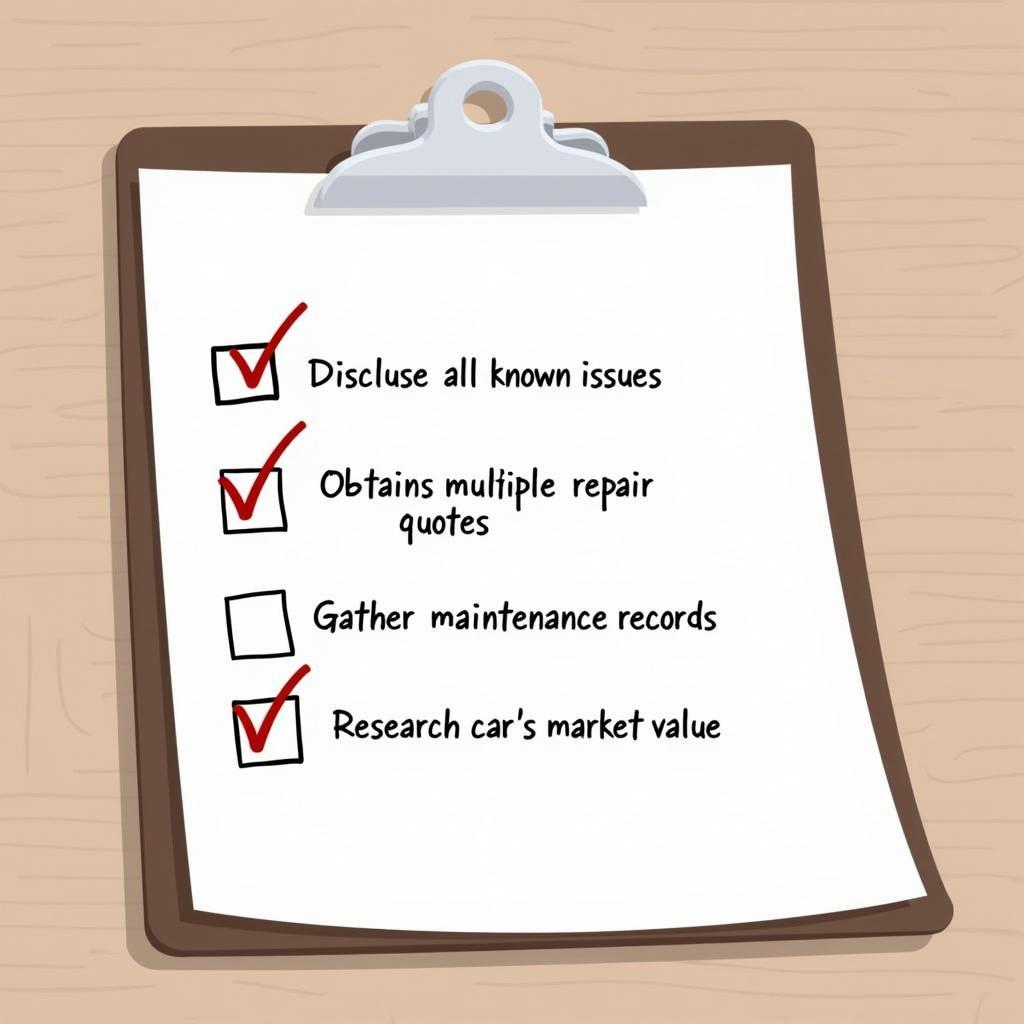Selling a car with problems can feel like navigating a minefield. Whether it’s a persistent engine knock, a faulty transmission, or a history of electrical gremlins, these issues can significantly impact your car’s resale value and make finding a buyer a challenge. But don’t despair, it is absolutely possible to sell a car with problems. This guide will walk you through your options, helping you understand the process and maximize your return.
Is it even legal to sell a car with known issues? Absolutely, as long as you’re transparent about them. Disclosing any problems upfront protects you legally and builds trust with potential buyers. Hiding problems can lead to legal repercussions down the line. More importantly, honesty is always the best policy. Learn more about disclosing issues when trading in your vehicle with articles like Car Trade In Disclosure Problems.
One popular option for those looking to offload a problematic vehicle quickly is trading it in. Dealerships are often willing to accept cars with issues, factoring the repair costs into the trade-in value. This offers a hassle-free way to get rid of your car and put the money towards a new one. You can find more information about this option in articles like Can You Trade in a Car That Has Mechanical Problems?
 Selling a car with problems checklist
Selling a car with problems checklist
Understanding Your Options When Selling a Car with Problems
You have several avenues to explore when selling a car with problems. Each option has its own pros and cons, so consider your individual circumstances and the severity of the car’s issues.
Selling Your Car “As Is” to a Private Buyer
Selling your car “as is” to a private buyer can often yield a higher price than trading it in, but it requires more effort. Be prepared to answer questions honestly and provide documentation of any repairs or maintenance performed. Transparency is key. This option attracts buyers looking for a bargain and who are mechanically inclined or willing to invest in repairs.
 Private buyer inspecting car engine
Private buyer inspecting car engine
Trading in Your Car with Problems
Trading in your car is a convenient option, especially if you’re purchasing another vehicle from the dealership. Be aware that the trade-in value will likely be lower than selling privately due to the dealership’s need to account for repairs. However, it’s a quick and easy way to get rid of your problematic car. Learn more about the trade-in process, particularly for vehicles with specific problems such as transmission issues, in our article about Trade In Value for Car with Transmission Problems.
Selling to a Junkyard or Scrap Yard
If your car’s problems are extensive and the repair costs outweigh its value, selling it to a junkyard or scrap yard might be the most practical solution. You won’t get much money, but you’ll avoid the hassle of finding a buyer and dealing with paperwork.
Selling to Online Car Buying Services
Several online car buying services, like Carvana, purchase cars with problems. These services offer a convenient way to sell your car quickly, and they typically handle all the paperwork. It’s important to research different services and compare their offers to get the best price. If you’re curious about this option, check out our article Will Carvana Buy a Car with Engine Problems?
How to Maximize Your Return When Selling a Car with Problems
Regardless of the selling method you choose, there are steps you can take to maximize your return.
- Be Transparent: Honestly disclose all known problems. This builds trust and avoids potential legal issues.
- Gather Documentation: Provide maintenance records and repair receipts to demonstrate the car’s history.
- Obtain Multiple Quotes: Whether you’re selling privately, trading in, or selling to an online service, get multiple quotes to ensure you’re getting a fair price.
- Consider Minor Repairs: Fixing minor cosmetic issues can improve the car’s appearance and potentially increase its value.
“Honesty is paramount when selling a car with issues,” says automotive expert, Michael Stevenson. “Full disclosure not only protects you legally but also attracts serious buyers who appreciate transparency.”
Navigating the Legal Landscape of Selling a Car with Problems
Understanding the legal implications of selling a car with problems is crucial. While selling a car “as is” is legal, it doesn’t absolve you from disclosing known issues. Misrepresenting the car’s condition or actively concealing problems can lead to legal action from the buyer.
“Disclosing known problems isn’t just ethical; it’s essential for legal protection,” adds automotive consultant, Sarah Chen. “A detailed description of the car’s condition in the bill of sale safeguards both parties involved.” Consider exploring resources like our article on Supply Demand Lemons Problem Car Insurance for more insights into the legal aspects of selling problematic vehicles.
Conclusion
Selling a car with problems can seem daunting, but with the right approach, it’s entirely manageable. By understanding your options, being transparent with potential buyers, and taking steps to maximize your return, you can successfully navigate this process. Need more assistance? Contact AutoTipPro at +1 (641) 206-8880 or visit our office at 500 N St Mary’s St, San Antonio, TX 78205, United States. We’re here to help you every step of the way.




Leave a Reply